Build Trust, Drive Traffic: AI Agents for High-Performance Employer Pages - Webinar Recap
We just finished a fantastic webinar on a real use case for AI agents for SEO optimisation of Job Boards with Oras.
You can watch the replay here (it is a free event):
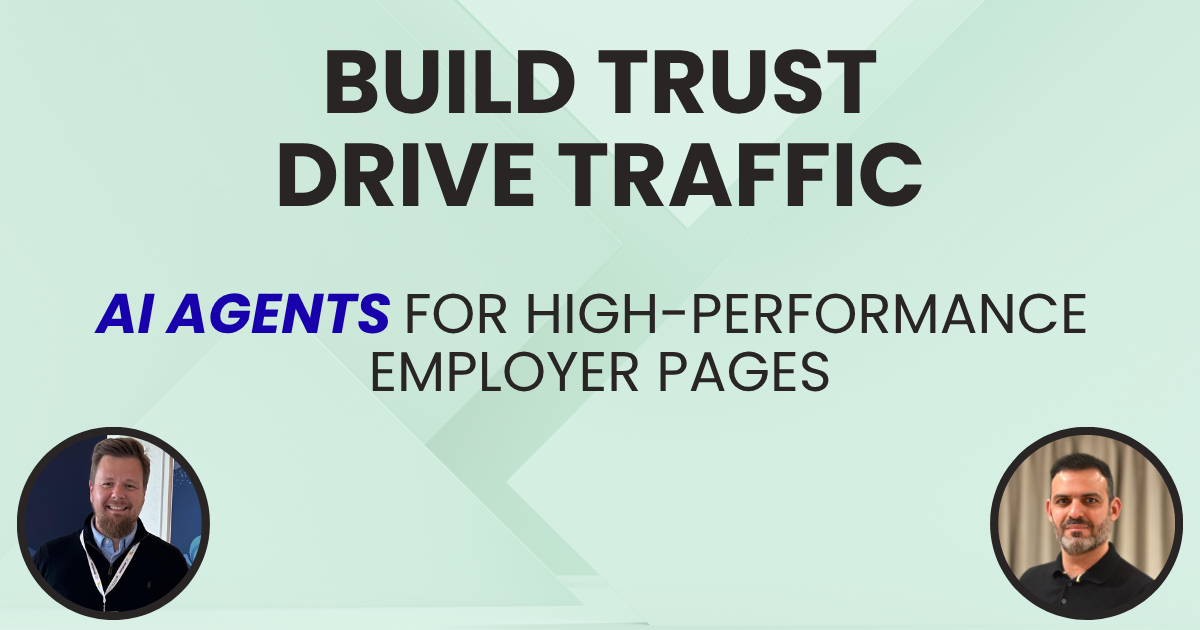
In this post, I would like to elaborate on what we demonstrated and why employer pages are a valuable addition to SEO strategies for job boards.
Organic traffic remains crucial for job boards.
During our recent webinar with Oras, we started with a simple poll: "Is organic traffic important for your job board business?" The overwhelming response was a resounding yes, with nine votes for "yes" against just two saying "not really" or "no."
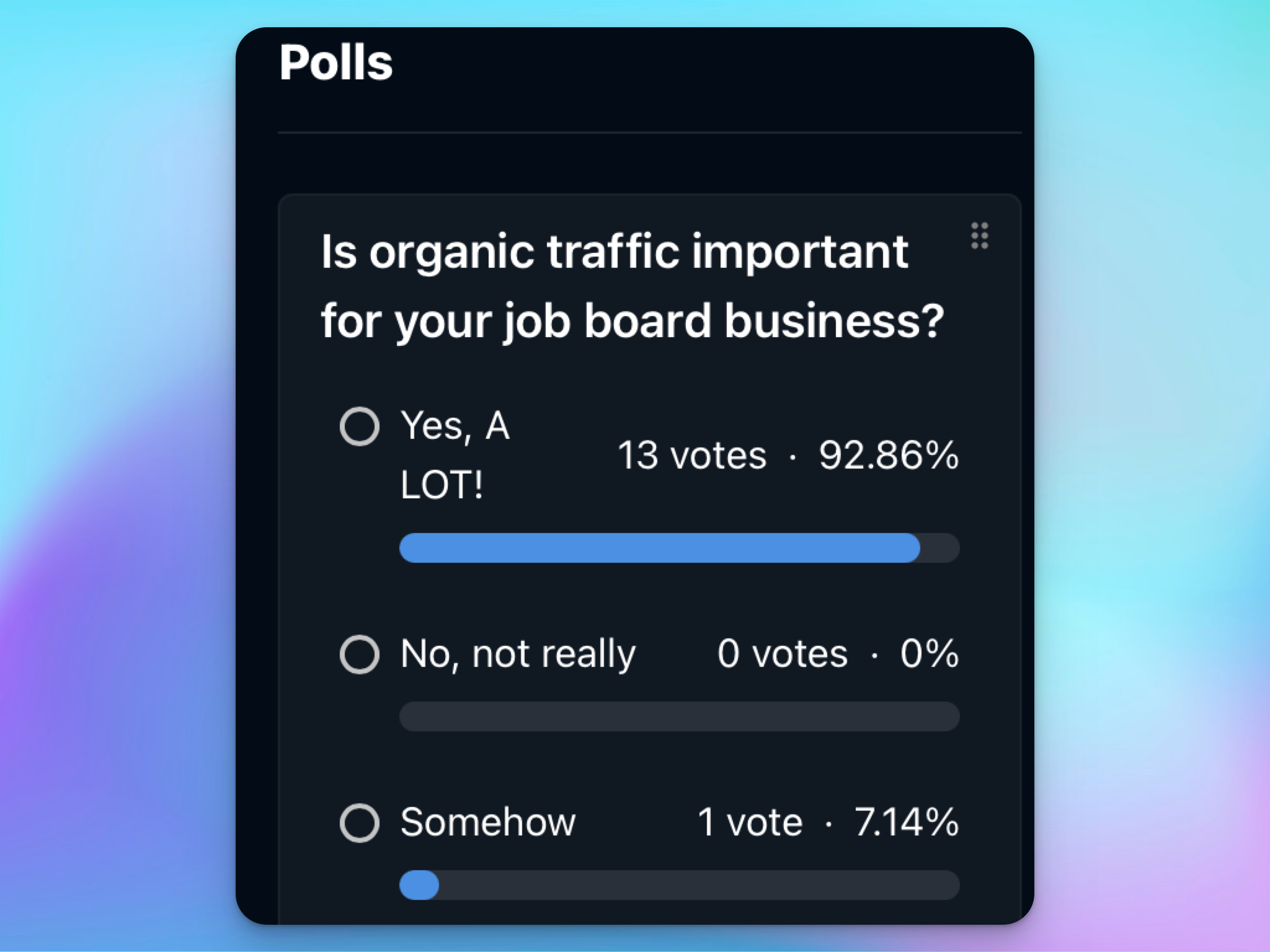
This tells us what we already know: organic traffic isn't just nice to have for job boards - it's essential for sustainable growth. The goal we're working toward is clear: build trust and drive organic traffic to your job board through strategic optimization. With AI disrupting traditional content strategies and search behaviors evolving rapidly, job boards now have the power to adopt more innovative approaches to capture and retain organic visibility.
Building on our last Google Jobs Optimization webinar
This webinar represents the continuation of a recurring theme we're passionate about in our educational series. In our previous session, we dove deep into Google Jobs optimization - a recording that's still available and packed with actionable insights for job board owners looking to maximize their visibility in Google's job search features. The 'Google Jobs Foundation' refers to the fundamental principles and strategies we discussed in that session, which are crucial for understanding the context of this webinar.
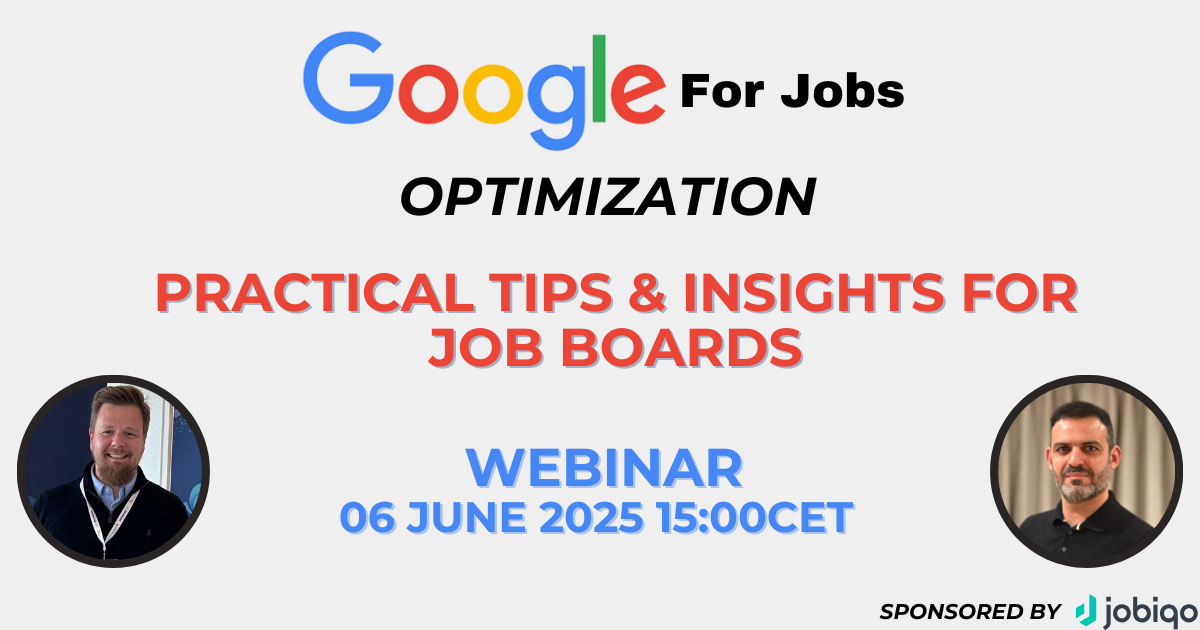
This was a paid webinar, but you can watch the replay with a 10% discount using the code: watch-replay.
Just follow the link
Now we're taking the next step: focusing specifically on employer pages as a powerful organic traffic strategy that complements your Google Jobs efforts. While Google Jobs captures immediate job search intent, employer pages unlock the broader ecosystem of employer-branded searches that represent a massive untapped opportunity.
Understanding search intent for job boards
When job seekers search for opportunities, they typically start with keywords on Google. Depending on their location and search terms, they might encounter Google Jobs features, job sites features, or land directly on organic search results, leading to category pages.
But here's what's crucial: not all keywords are created equal. There are four main types of search intent, but only one matters for job boards.
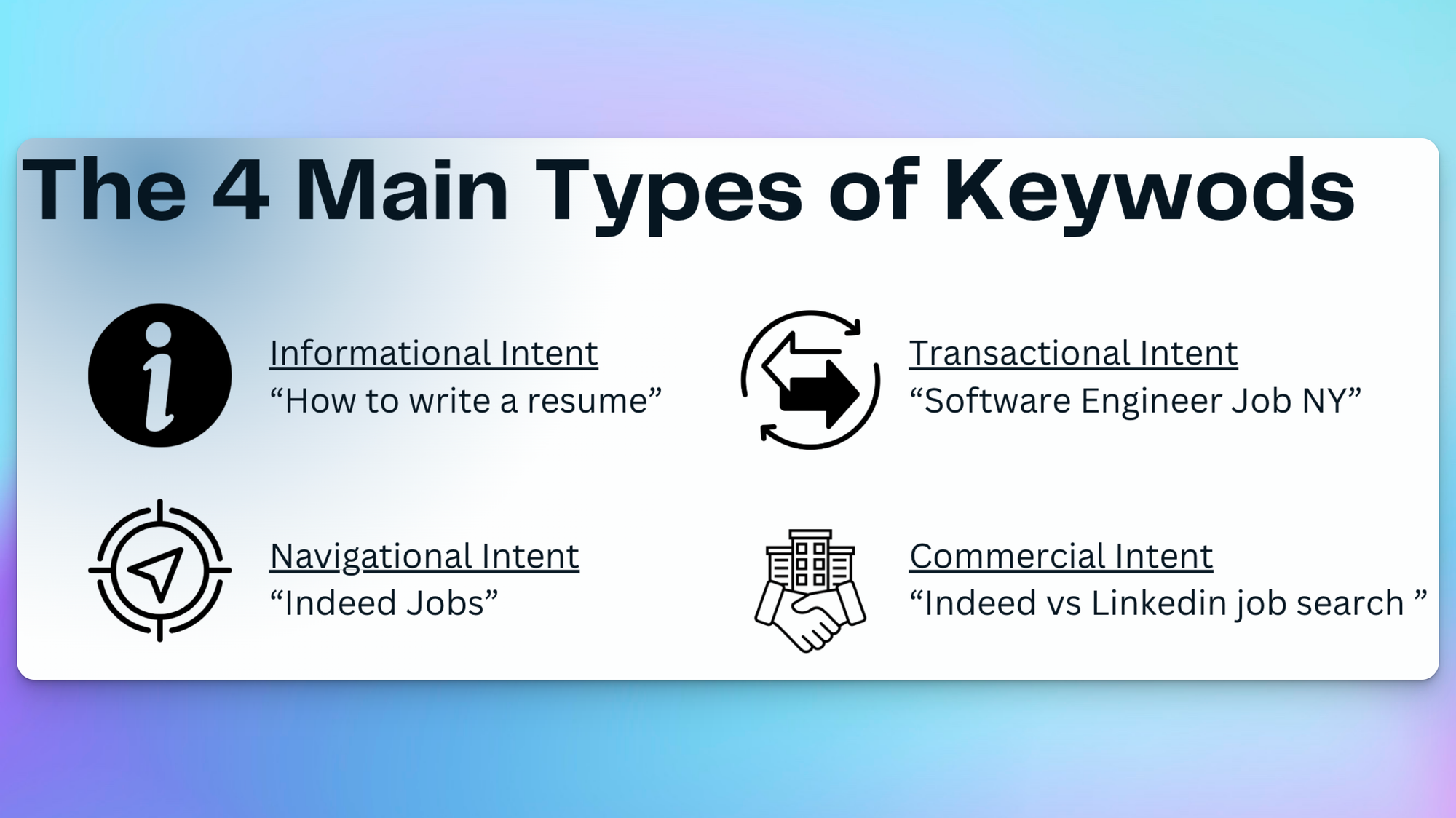
Transactional Intent Keywords:
These are searches like 'software engineer job in New York' where someone is ready to take action - find, search for, and apply to jobs. These keywords are relatively safe from AI disruption because you can't effectively summarize a list of job opportunities in an AI overview. Understanding and targeting these keywords is crucial for job boards, as they represent high-intent searches that are more likely to lead to job applications and conversions.
Informational Intent Keywords:
Searches like "how to write a resume" are being decimated by AI overviews and chat interfaces. These will continue losing traffic over time.
Navigational Intent Keywords:
When someone searches for a specific destination, such as "Indeed jobs."
Commercial Intent Keywords:
Comparison searches, such as "Indeed vs LinkedIn job search."
The real opportunity lies in transactional keywords, especially those that include employer names. Real data from job boards shows searches like "jobs at Clark Atlanta University," "Deutsche Post jobs," or even particular queries like "Retail jobs, Macy's, part-time, New York."
These employer-branded searches represent the exact keywords we want to capture with optimized employer pages - they're detailed, specific, and indicate high job-seeking intent.
The Employer pages opportunity
The data proves the massive opportunity. Take Indeed's employer pages as a prime example: their company subdirectory ranks for 8.5 million keywords. From them, there are about 190K containing "job" or "jobs" - all transactional intent keywords. Diving further, 100K ranks in the top 10 positions, with 31,000 holding the essential top 3 spots.
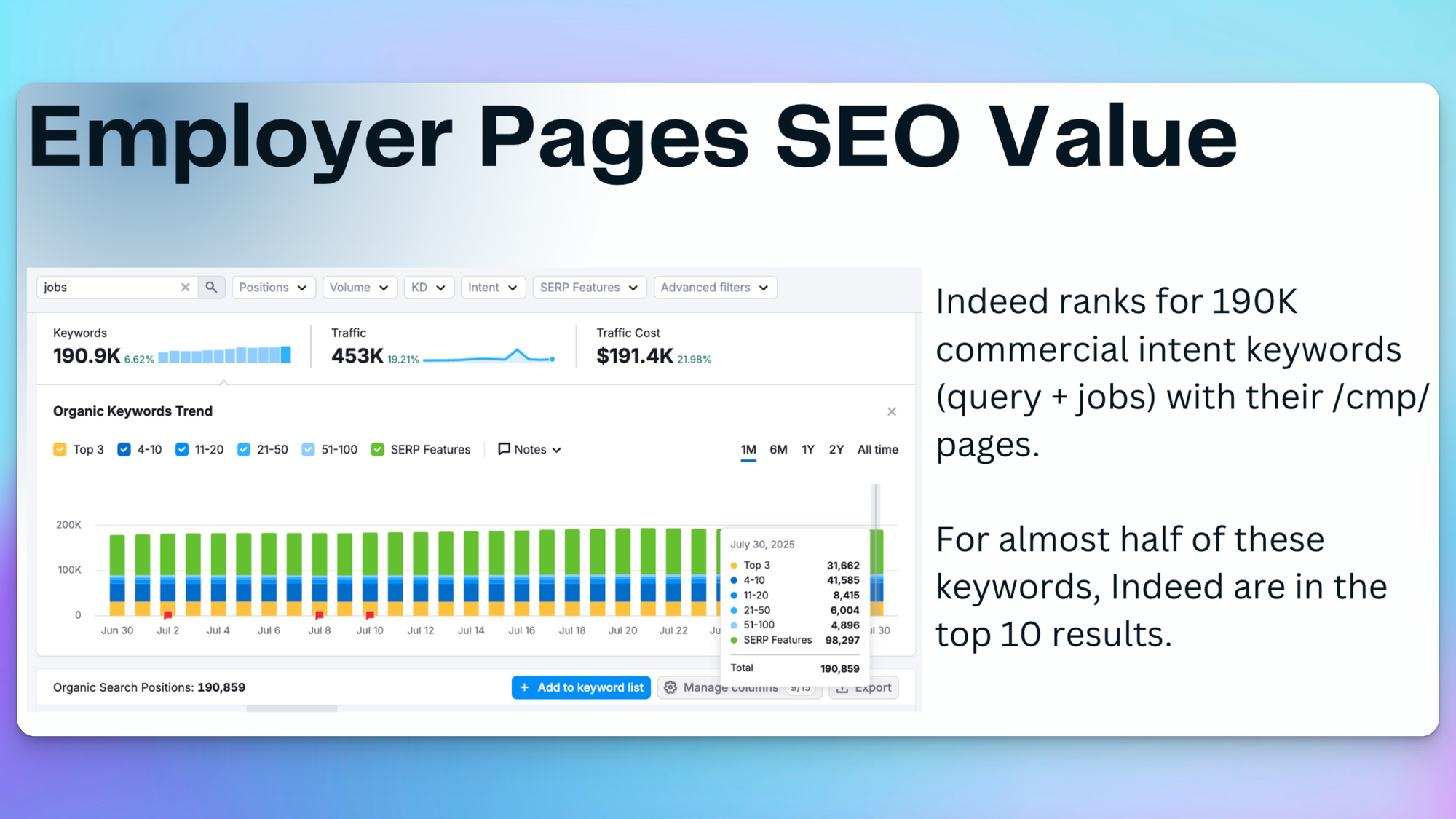
Here's what's remarkable: Indeed consistently outranks actual company career pages. Search for "Pacific Alliance Medical Center jobs" and Indeed appears first, beating the company's own ATS system. This pattern repeats thousands of times across different employers and search queries, showing the potential for employer pages to outperform even the most established company sites and ATS.
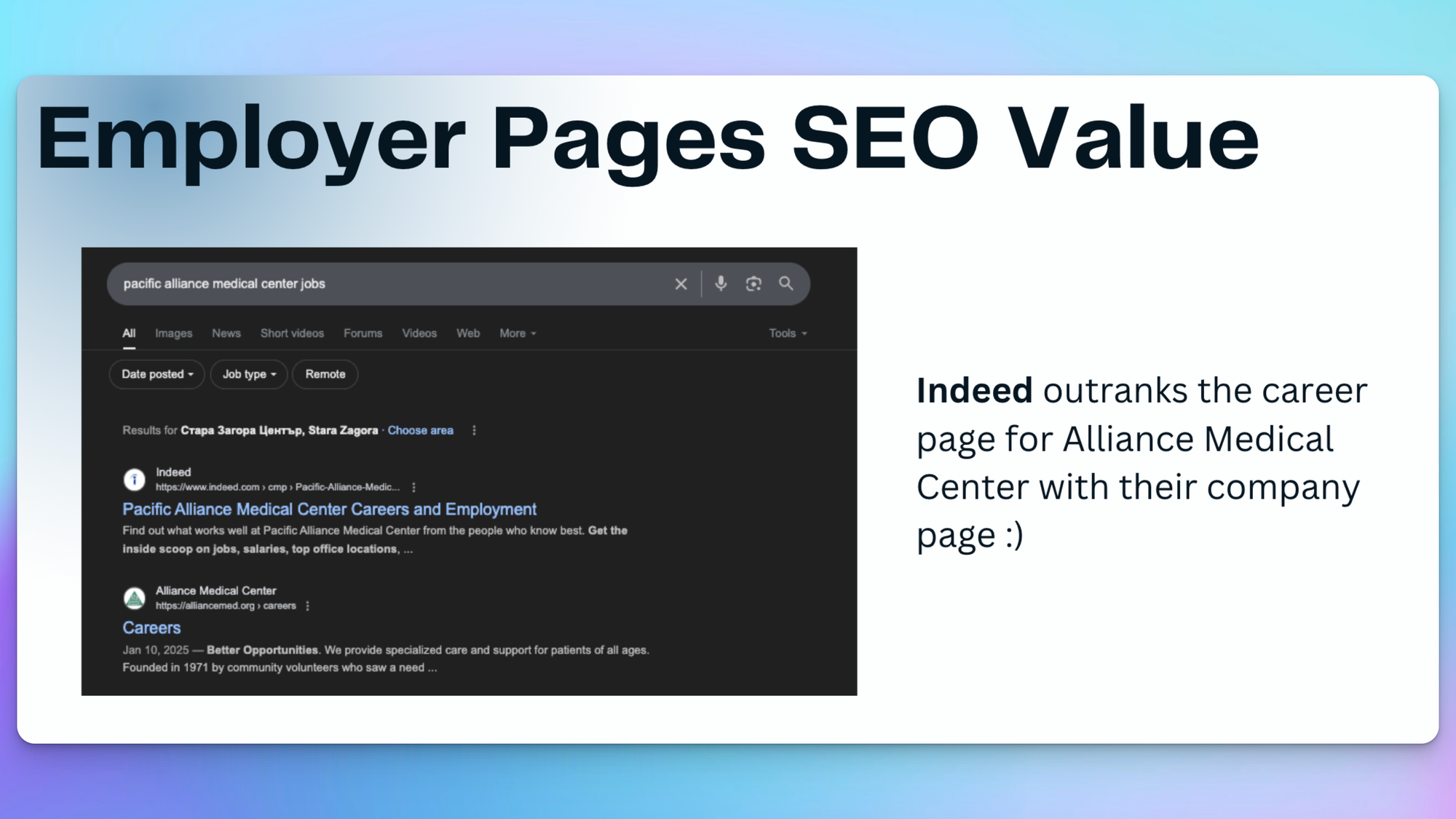
The opportunity extends beyond just ranking #1 - positions 2-10 still drive significant traffic. And here's the kicker: you can often outrank ATS systems because most are frankly terrible at SEO. It's not their core expertise, so they don't invest in it.
Employer pages offer multiple SEO advantages that make them an evergreen traffic source:
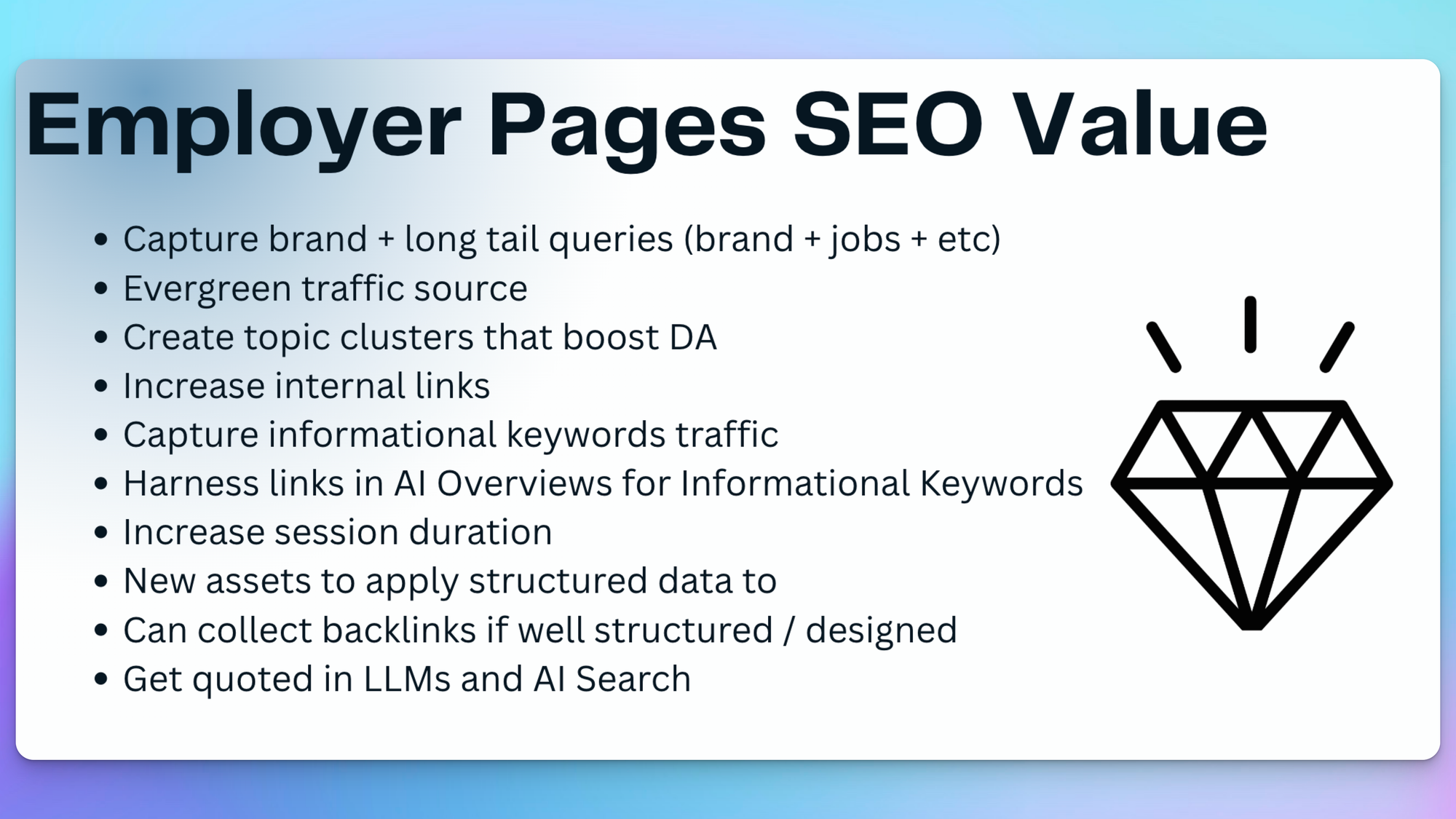
- Brand and long-tail keyword capture: These pages target employer name + job combinations, from simple "Company X jobs" to detailed queries like "Retail jobs, Macy's, part-time, New York"
- Evergreen performance: Once they rank, employer pages maintain their position with minimal ongoing optimization
- Topic clusters: create powerful internal linking structures from job pages to employer profiles to category pages
- Extended engagement: rich employer content increases session duration compared to standard job listings
- Structured data opportunities: perfect pages for implementing Google's structured data markup requirements (organization, FAQ)
- Backlinks: well-crafted employer pages naturally attract links from other sites
Watch the full webinar:
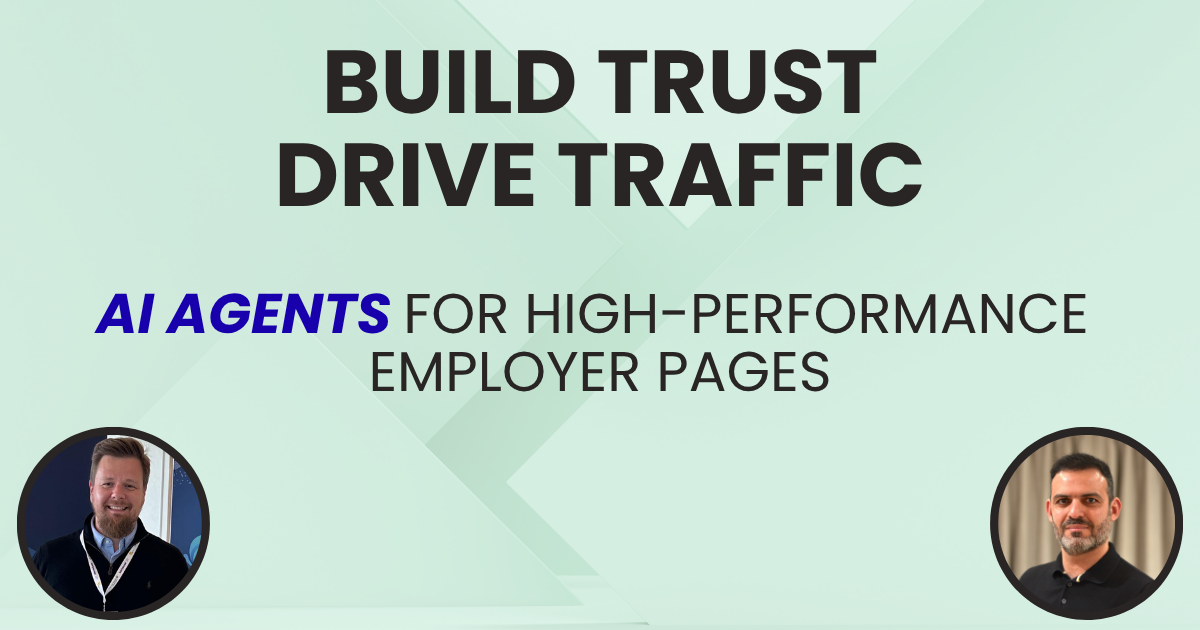
Why high-performance employer pages are hard to build?
Creating effective employer pages sounds straightforward until you dive into execution. Most employer pages trigger Google's thin content classifiers, and some even get marked as spam, devastating for job boards.
The challenge lies in several areas:
Content Richness Requirements
High-performing employer pages need comprehensive, unique content. We looked at some of the best examples from multiple job boards:
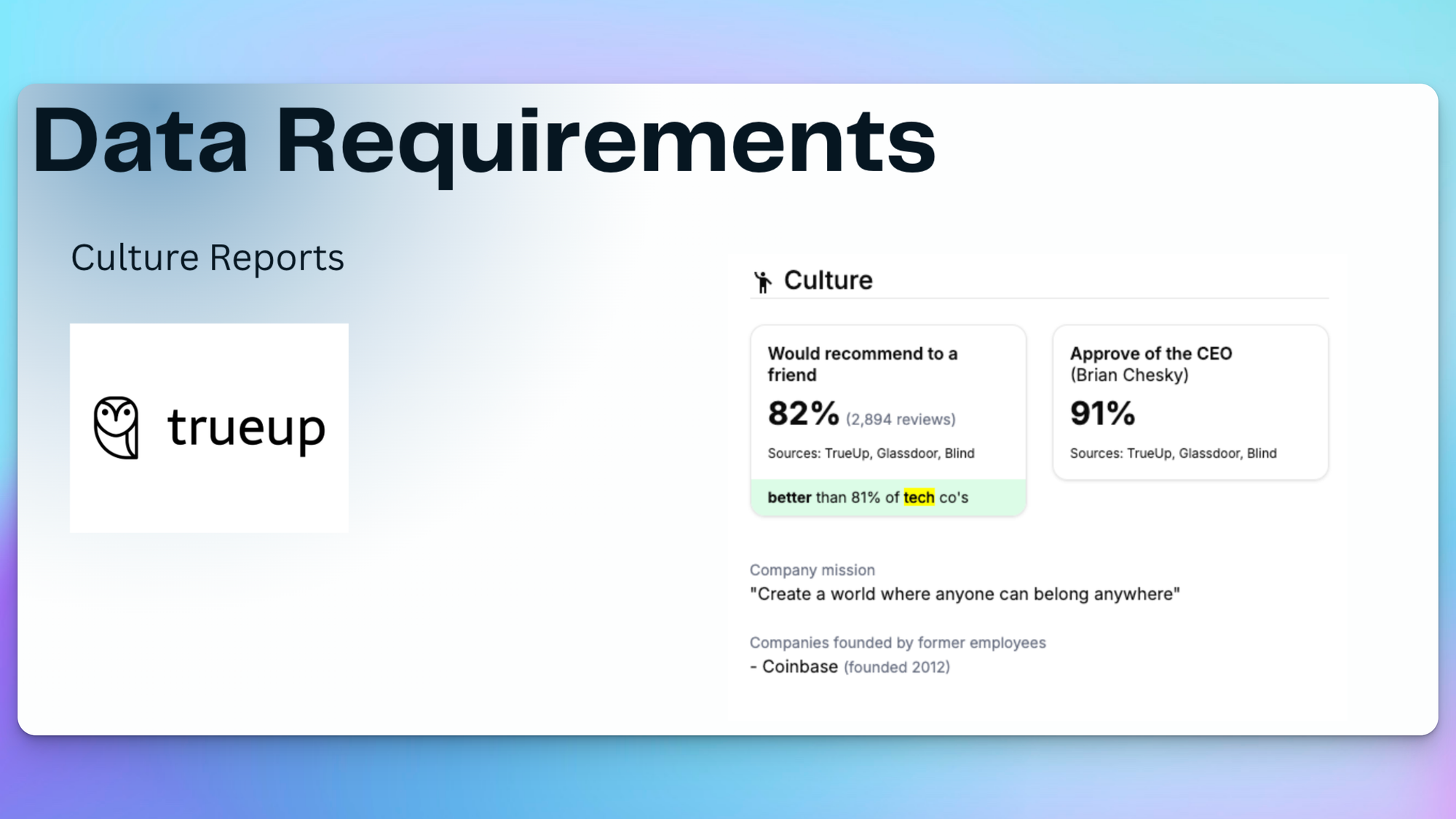
- Glassdoor's detailed company descriptions that go beyond basic facts
- Kununu's powerful review sections that drive significant organic traffic through authentic employee feedback
- TrueUp's financial data and funding information - crucial for startup job seekers evaluating company stability
- Department overviews and organizational structure help candidates understand where they'd fit
- Salary reports for specific roles targeting valuable informational keywords
- Team and leadership information - increasingly crucial for verifying company legitimacy (with 15% of jobs on Google being fake, this social proof matters)
- Company culture metrics and employee satisfaction data
- FAQ sections capturing long-tail informational searches
Operational Challenges:
• Time-intensive updates: Companies change constantly - leadership, financials, benefits, tech stacks
• Third-party data costs: Scraping and integrating external sources for comprehensive information
• Scale vs. Quality: Programmatic approaches often create thin, templated content that Google penalizes
Before AI agents, building rich employer pages required either manual content creation (expensive and slow) or templated approaches (ineffective and risky, often hitting thin content classifiers).
The best examples, like specialized employer branding campaigns, only worked when someone was paying specifically for that premium content and imagery.
The AI Agent Solution
During our webinar, Oras provided a live demonstration of AI agents in action, showing exactly how this technology solves the employer page challenge. Here's what happened behind the scenes:
Five Specialized Agents Working in Parallel:
- Opening roles agent: researching current job opportunities at the company
- Company information agent: gathering comprehensive company data
- Perks and benefits agent: identifying employee benefits and compensation details
- Salary range agent: Analyzing compensation data and trends for the given company
- Trends agent: the most sophisticated of the group, analyzing Google search patterns to understand what people ask about when searching for "[company name] + jobs"
Oras also explained that the agents have two different depths of research available:
Simple Research: Takes 10-30 seconds, processes up to 10 links, uses 5,000-15,000 tokens - perfect for basic company information.
Deep Research: Takes 4-7 minutes, processes 30-60 links, uses 500,000-2 million tokens. This uses "chain of thought" reasoning - breaking down the research intent into multiple questions, researching each one, analyzing if the answers are sufficient, and continuing research if needed.
We also covered extensively what tech stack he used to build the demo app (OpenRouter, Claude, Qwen).
Finally, we also discussed what the realistic expectations are for these tools. AI agents need time to navigate pages, extract content, summarize information, and analyze data.
We finished the demo showing the final output. Once all agents complete their research, an AI integration reads the compiled research and generates a complete, rich employer page, solving the scale vs. quality challenge that has plagued job boards for years.
Handling AI Accuracy
By now, everyone knows that AI agents hallucinate. We did not ignore this, because we know that these agents will do the hard work of gathering all the information for you, but it's really up to you to validate and check that the data is correct before displaying it.
Our main proposal isn't just automated page generation - it's using AI agents to gather comprehensive research that enables you to approach employers with a compelling value proposition: "Look, I can create a highly customized page for you on our job board. This is the information we know about you. This is the information available online. If there's anything you'd like to correct, this is your chance."
We also discussed additional validation like using multiple models from different families to validate outputs. If three models agree on something, it's most likely accurate - unless it's information they've never encountered, in which case all three might be wrong. This cross-validation approach significantly improves accuracy while maintaining the speed advantage of AI-powered research.
Summary
The combination of employer-branded search opportunity and AI agent capabilities represents a perfect storm for job boards ready to scale their organic traffic. While competitors struggle with thin content and manual processes, smart job board operators can now build hundreds of rich, unique employer pages that capture valuable long-tail traffic and develop direct relationships with employers.
The technology exists today. The search volume is proven. The question is: will you be among the first to capitalize on this opportunity, or will you watch competitors claim the employer-branded search territory in your market?
Ready to dive deeper? Watch the full webinar replay from July 31st, 2025, where Oras and I demonstrate the complete AI agent workflow and answer audience questions about implementation, costs, and scaling strategies.


